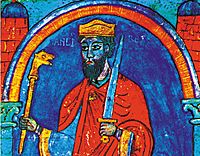Sancho I of León facts for kids
Quick facts for kids Sancho I |
|
|---|---|

A miniature of Sancho I, from the Tumbo A in the Cathedral of Santiago de Compostela.
|
|
| King of León | |
| Reign | 956–958 |
| Predecessor | Ordoño III |
| Successor | Ordoño IV |
| Reign | 960–966 |
| Predecessor | Ordoño IV |
| Successor | Ramiro III |
| Born | c. 932 |
| Died | c. 19 December 966 |
| Burial | Basilica of San Isidoro |
| Consort | Teresa Ansúrez |
| Issue | Ramiro III Urraca |
| Dynasty | Astur-Leonese dynasty |
| Father | Ramiro II of León |
| Mother | Urraca Sánchez of Pamplona |
| Religion | Roman Catholicism |
| Signature |  |
Sancho I of León, also known as Sancho the Fat, was a king who ruled the Kingdom of León twice. He was born around 932 and passed away on December 19, 966. After his first time as king, Ordoño IV took over in 958. When Sancho died, his son Ramiro III became the next king.
Contents
Becoming King of León
Sancho was the son of Ramiro II of León and Queen Urraca Sánchez of Pamplona. He was also the grandson of Sancho I of Pamplona and Toda Aznárez. When his father, Ramiro II, died in 951, Sancho's older brother, Ordoño III, became king.
Sancho first tried to claim the throne from his brother. After Ordoño III died in 956, Sancho finally became king. He had the support of some important nobles, his grandmother, and the Count of Castile, Fernán González of Castile. However, his rule didn't last long.
Losing and Regaining the Throne
Only two years later, in 958, Sancho was removed from power by nobles led by Fernán González of Castile. They were unhappy with his extreme weight. Ordoño the Wicked then became king, ruling from 958 to 960.
Sancho had also upset the people of Córdoba by not keeping a peace agreement his brother had made. This led to a defeat in 957, which made people trust him less and helped lead to him being overthrown.
To get his throne back, Sancho went to his grandmother, Queen Toda of Pamplona, for help. Queen Toda, Sancho, and his wife Teresa Ansúrez traveled to Córdoba in 958. There, they made a deal with Abderramán III, the leader of the Caliphate of Córdoba. He agreed to help Sancho get his throne back in exchange for some land.
During his time away, Sancho reportedly lost a lot of weight with the help of a court doctor. The doctor only allowed him to have special drinks for forty days.
With the help of the Moors (Muslims from Al-Andalus) and nobles from León and Navarre, Sancho's army took Zamora in 959 and León in 960. Sancho I was then king again. Ordoño IV fled to Asturias. However, Sancho soon forgot his agreement with Abderramán III. This made Abderramán III support Ordoño IV again, though this time, it only led to a few small attacks on Sancho's lands.
Later Years as King
In his final years as king, the nobles in Castile and Galicia became more independent. This meant they had more power and didn't always follow the king's orders.
In 966, King Sancho founded a monastery in the city of León. It was named San Pelayo, after a martyr whose remains were brought to León by the king. This monastery became an important place for royal women, like princesses and widowed queens, who wanted to become nuns.
The King's Death
Sancho I died in 966, when he was not yet 35 years old. It is believed he was poisoned. A historical record says that a rebel count named Gonzalo Menéndez gave him a poisonous apple. However, some historians are not sure if it was this specific count.
Sancho I was succeeded by his son, Ramiro III. His wife was Queen Teresa Ansúrez. The exact day Sancho died is not known, but it was likely between November 15 and December 19, 966.
Where Sancho I Was Buried
Sancho I was first buried in the monastery of Castrelo de Miño. Later, his body was moved to the city of León. He was buried in the church of San Salvador de Palat del Rey. This church was part of a monastery that no longer exists. Sancho's father, Ramiro II, and his brother, Ordoño III, were also buried there.
Eventually, the remains of these three kings were moved again. They were taken to the Basilica of San Isidoro de León. They were placed in a chapel, not in the main royal burial area. Other kings, like Alfonso IV, were also buried in this chapel.
See also
 In Spanish: Sancho I de León para niños
In Spanish: Sancho I de León para niños
 | Audre Lorde |
 | John Berry Meachum |
 | Ferdinand Lee Barnett |

